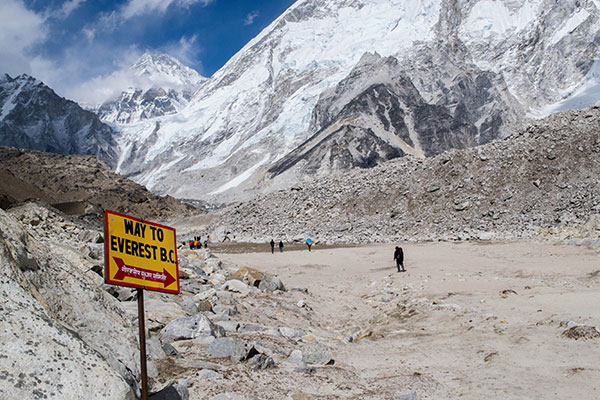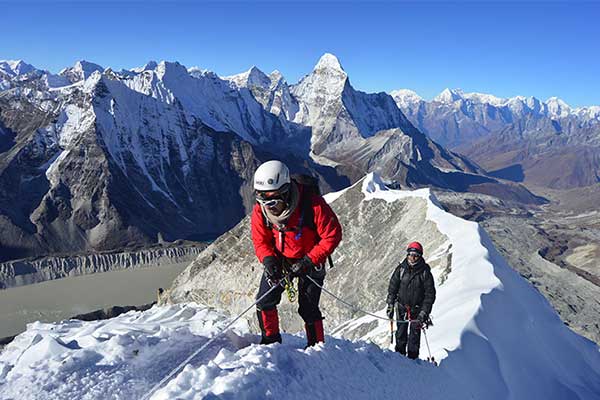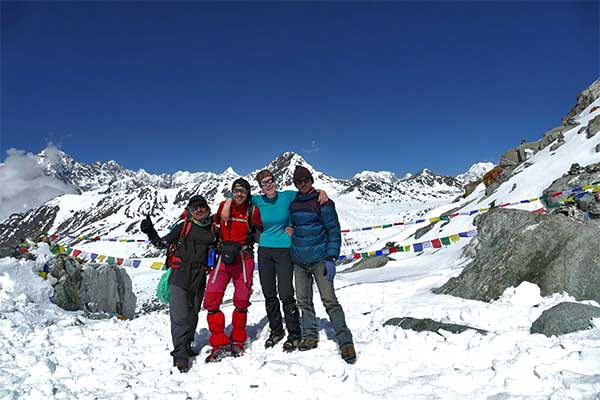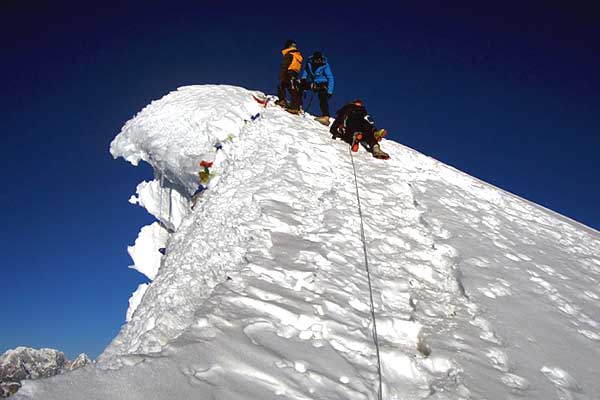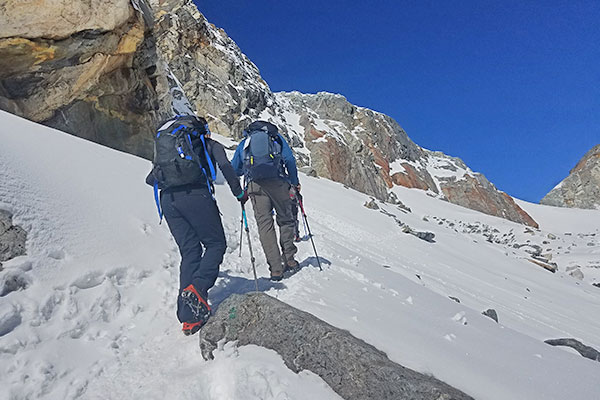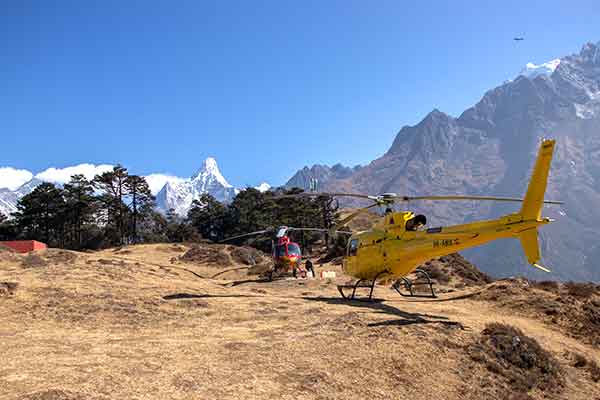Overview
Duration :
19 Days
Secondary Activity:
Nature and Sherpa Culture
Max altitude :
6,189m/20,305ft.
Transportation:
Private Vehicle and Domestic Flight
Trip ends in:
Kathmandu
Accomodation:
Lodge and Tent Camp
Primary activity:
Trekking and Climbing
Group Size:
Min. 1 Pax
Country:
Nepal
Trip starts from:
Kathmandu
Diffficulty:
Strenuous Plus
Meals:
Nepali and Continental
Best Season:
Autumn and Spring
Trip route:
Kathmandu - Lukla - Phakding - Namche Bazaar -Tengboche-Pheriche-Lobhuche-Gorak Shep-Everest Base Camp-Gorak Shep- Kala Patthar- Dingboche – Chhukhung-Island Peak Base camp-Pangboche-Namche Bazaar-Lukla-Kathmandu
Trip introduction
Everest Base Camp Trek with Island Peak Climbing give us an opportunity to step into the base camp of the highest Himalayas. And then scale the popular Island Peak which is also known as ‘Imja Tse’ in the local language. The major highlights of this trip are spectacular views of the highest Himalayas, especially from the Kalapathar viewpoint; visiting monasteries, exploring the cultures and traditions of local inhabitants; and gaining that exquisite feeling of adventure while being at the summit of the Island Peak.
Journey: Everest Base Camp Trek with Island Peak Climbing
The trek initiates after we take a short and sweet flight to Lukla airstrip from Kathmandu. Firstly, we start trekking all the way up through the river banks of Dudhkoshi crossing several suspension bridges. While making our way through Everest trekking trails, some of the highest Himalayas and other snow-capped peaks like Kusum Kngaro and Thamserku, etc will enclose us. Then we will acclimatize at Namche Bazaar, the major market in the Khumbu region. During our acclimatization days, there are plenty of few hours short sidewalks; which help our body adapt to high-altitude conditions. Leaving behind the colorful culturally rich villages of Tengboche and Pheriche, we will stay at Gorakshep.
In the next couple of days, we step at EBC, hike to Kala Patthar for amazing sunrise views over the world’s highest mountain; and descend towards Chukkung to get ready for Island peak climbing preparations. According to weather conditions, it may take a day or two for a successful ascent of an Island peak climbing adventure. Finally, we trek back to Namche, Lukla, and fly back to Kathmandu; which concludes our fun-filled, exciting, and rewarding trip of Everest Base Camp Trek with Island Peak Climbing Adventure.
Best Season and Physical Fitness
The best experience of this trek is during the months of Late February, March, April May, September, October, November, and early December. Mountaineering experience is not mandatory but you need sound physical and mental fitness prior to joining this trip. Our professional Sherpa guides will provide proper instruction on using ropes and ice axes necessary while scaling Island Peak. So, join this trip with Nepal Mountain Trekkers for true Everest trekking and peak climbing experience.
Special Note:
If this itinerary doesn’t suit your requirement or if you want to customize it, please feel free to contact us. This trek could be customized as per your required time frame and budget limits.
Overview
-
Day 1Arrive in Kathmandu (1,300m /4,264 ft)
-
Day 2Kathmandu: Sightseeing and Trek Preparation
-
Day 3Kathmandu – Lukla – Phakding (2,652m/8,700ft): 40 minutes flight, 3- 4 hours trek (Trekking times only)
-
Day 4Phakding – Namche Bazaar (3,440m/11,280 ft): 5 – 6 hrs
-
Day 5Namche Bazaar: Acclimatization Day
-
Day 6Namche Bazzar to Tengboche (3,870m/12,694ft): 5 – 6 hrs
-
Day 7Tengboche to Pheriche (4,240 m/ 13,911 ft):5 – 6 hrs
-
Day 8Pheriche – Lobhuche(4,910/ 16109 ft):7-8 hrs
-
Day 9Lobuche – Gorak Shep (5,170 m/16,961ft) – Everest Base Camp (5,364m/17,594ft) – Gorak Shep: 8 – 9 hrs
-
Day 10Gorak Shep – Kala Patthar (5545m/18,192ft) – Dingboche (4,360 m/14,300ft): 7-8 hrs
-
Day 11Dingboche – Chhukhung[4,730m/ 15519 ft] : 3-4 hrs
-
Day 12Chhukung to Island Peak Base camp (5,200m/17,060ft): 3-4 hours
-
Day 13Prepare Climb training on Island Peak Base Camp
-
Day 14Island Peak Base Camp to Summit (6,189m/20,305ft.) and back to Base Camp (5,600m/18,372ft) 10-12 hours
-
Day 15Island Peak Base Camp to Pangboche (3,985m/13,074ft) 5-6 hours
-
Day 16Pangboche to Namche Bazaar: 4-5 hours
-
Day 17Namche Bazaar to Lukla: 6-7 hours
-
Day 18Fly to Kathmandu
-
Day 19Departure Day
Detail Itinerary
Day 1 : Arrive in Kathmandu (1,300m /4,264 ft):
A warm welcome to the naturally blessed and culturally rich Himalayan country, Nepal. Upon your arrival at Kathmandu, you’ll be met by a representative from Nepal Mountain Trekkers at Tribhuvan International Airport and transferred to your hotel (Hotel Green Horizon or a similar standard). After check-in, enjoy some free time relaxing in your cozy room or explore the lively Thamel area before ending the day.
Day 2 : Kathmandu: Sightseeing and Trek Preparation:
Start your morning with breakfast at the hotel before visiting the Nepal Mountain Trekkers office in Thamel, where you’ll meet your team — including your tour guide, trek leader, and operations director. After finalizing trek preparations and checking your equipment, enjoy a guided sightseeing tour of Kathmandu’s UNESCO World Heritage Sites, including Kathmandu Durbar Square, Swayambhunath (Monkey Temple), Pashupatinath Temple, and Boudhanath Stupa. Return to your hotel in the evening for an overnight stay in Kathmandu.
Day 3 : Kathmandu – Lukla – Phakding (2,652m/8,700ft): 40 minutes flight, 3- 4 hours trek (Trekking times only):
After an early breakfast, transfer to the airport for a scenic 40-minute flight to Lukla, the gateway to Everest. Enjoy breathtaking views of the Himalayan peaks before landing at the famous Tenzing-Hillary Airport. Upon arrival, meet your trekking crew and begin your 3–4 hour trek to Phakding. Walk through charming Sherpa villages, cross suspension bridges, and follow the Dudh Koshi River as you get your first taste of trekking in the Everest region. Overnight stay in Phakding.
Day 4 : Phakding – Namche Bazaar (3,440m/11,280 ft): 5 – 6 hrs:
After breakfast, begin your trek with several ups and downs, crossing the Dudh Koshi River over suspension bridges. Continue gradually to Monjo, the entrance of Sagarmatha National Park, where your permits are checked before heading on to Jorsale. From here, follow a steep trail with rewarding views of Everest and other snow-capped peaks as you approach the bustling Sherpa town of Namche Bazaar. Enjoy the lively mountain atmosphere and stay overnight in Namche Bazaar.
Day 5 : Namche Bazaar: Acclimatization Day:
Today is your first acclimatization day to help your body adjust to higher altitudes and reduce the risk of acute mountain sickness. Engage in a short hike around Thame or explore Namche Bazaar, observing the vibrant Sherpa lifestyle. This is also a great opportunity to meet fellow trekkers and hear stories from experienced Everest climbers. Return to Namche Bazaar for an overnight stay.
Day 6 : Namche Bazzar to Tengboche (3,870m/12,694ft): 5 – 6 hrs:
After breakfast, trek from Namche Bazaar to Tengboche, enjoying spectacular views of the Everest Himalayan ranges along the way. Pass through scenic trails, observe alpine flora and fauna, and stop for lunch at Phunki Thega. Arrive in Tengboche by afternoon and visit the historic Tengboche Monastery, rich in Sherpa culture and tradition, while taking in stunning close-up views of Everest, Ama Dablam, and surrounding peaks. Overnight stay in Tengboche.
Day 7 : Tengboche to Pheriche (4,240 m/ 13,911 ft):5 – 6 hrs:
After breakfast, continue trekking from Tengboche to Pheriche through the heart of Sagarmatha National Park. The trail passes through beautiful rhododendron forests, small Sherpa villages, and offers panoramic views of Ama Dablam and other Himalayan peaks. Stop along the way to rest and enjoy the scenery before reaching Pheriche in the late afternoon, a quiet village known for its mountain lodge accommodations. Overnight stay in Pheriche.
Day 8 : Pheriche – Lobhuche(4,910/ 16109 ft):7-8 hrs:
After breakfast, begin your trek from Pheriche to Lobuche, gradually ascending through the rugged terrain of the Khumbu region. Pass through Thukla and pay respects at the memorials dedicated to climbers who lost their lives on Everest. Enjoy breathtaking views of Everest, Lhotse, and Nuptse along the way. The trail is challenging but rewarding, leading to the small settlement of Lobuche. Overnight stay in Lobuche.
Day 9 : Lobuche – Gorak Shep (5,170 m/16,961ft) – Everest Base Camp (5,364m/17,594ft) – Gorak Shep: 8 – 9 hrs:
Depart Lobuche early and trek to Gorak Shep, the final stop before Everest Base Camp. Situated at 5,170m, be mindful of possible high-altitude effects, though careful acclimatization and guidance minimize risks. From Gorak Shep, continue to Everest Base Camp (5,364m), the iconic destination of your trek. Capture unforgettable moments against the backdrop of the world’s highest peaks, then return to Gorak Shep for an overnight stay.
Day 10 : Gorak Shep – Kala Patthar (5545m/18,192ft) – Dingboche (4,360 m/14,300ft): 7-8 hrs:
Start early with a pre-dawn hike to Kala Patthar, the best vantage point for sunrise views of Everest, Lhotse, and Nuptse. After soaking in the panoramic Himalayan scenery and capturing memorable photographs, descend to Gorak Shep for a short rest and lunch. Continue trekking down to Dingboche, enjoying the changing landscapes and Sherpa villages along the trail. Overnight stay in Dingboche.
Day 11 : Dingboche – Chhukhung[4,730m/ 15519 ft] : 3-4 hrs:
After breakfast, trek from Dingboche to Chhukhung on a scenic trail that gradually ascends through rocky landscapes and alpine terrain. Enjoy views of Ama Dablam, Island Peak, and surrounding Himalayan peaks as you approach this quiet village, which serves as the base for Island Peak climbing. The trek is relatively short, taking 3–4 hours, allowing time to rest and prepare for the upcoming climb. Overnight stay in Chhukhung.
Day 12 : Chhukung to Island Peak Base camp (5,200m/17,060ft): 3-4 hours:
After breakfast, begin the trek from Chhukhung to Island Peak Base Camp, a gradual ascent of 3–4 hours through rocky trails and glacial moraines. Along the way, enjoy spectacular views of Island Peak, Lhotse, and Ama Dablam. Arriving at Base Camp, you’ll prepare for the climb, get familiar with the route, and rest for the night. Overnight stay at Island Peak Base Camp.
Day 13 : Prepare Climb training on Island Peak Base Camp:
Spend the day at Island Peak Base Camp focusing on climbing preparation and training. Under the guidance of experienced Sherpa climbers, you will practice using crampons, ice axes, and ropes, and learn essential techniques for high-altitude mountaineering. This day is crucial for familiarizing yourself with the route and safety protocols before the summit attempt. Rest well and stay hydrated to ensure you are ready for the climb tomorrow. Overnight at Island Peak Base Camp.
Day 14 : Island Peak Base Camp to Summit (6,189m/20,305ft.) and back to Base Camp (5,600m/18,372ft) 10-12 hours:
Start very early in the morning for the Island Peak summit attempt, ascending through steep snow and ice slopes with the support of Sherpa guides. Reach the summit at 6,189m, celebrating incredible panoramic views of Everest, Lhotse, Ama Dablam, and surrounding Himalayan peaks. After taking in the breathtaking scenery and photos, carefully descend back to Base Camp (5,600m) to rest and recover. This is a long and challenging day, lasting 10–12 hours, but the sense of achievement is unforgettable. Overnight at Island Peak Base Camp.
Day 15 : Island Peak Base Camp to Pangboche (3,985m/13,074ft) 5-6 hours:
After breakfast, descend from Island Peak Base Camp to Pangboche, enjoying a gradual downhill trek through the scenic Khumbu region. Pass through Sherpa villages, mani walls, and terraced fields, taking in views of Ama Dablam and surrounding peaks along the way. The trek takes approximately 5–6 hours, offering a relaxing pace after the summit climb. Overnight stay in Pangboche.
Day 16 : Pangboche to Namche Bazaar: 4-5 hours:
After breakfast, trek from Pangboche back to Namche Bazaar. The trail gradually descends through Sherpa villages, rhododendron forests, and suspension bridges over the Dudh Koshi River. Enjoy your last close-up views of Ama Dablam and Everest region peaks as you return to the bustling town of Namche Bazaar. The trek takes about 4–5 hours. Overnight stay in Namche Bazaar.
Day 17 : Namche Bazaar to Lukla: 6-7 hours:
After breakfast, begin the final leg of your trek from Namche Bazaar to Lukla. The trail descends through forests, traditional Sherpa villages, and suspension bridges over the Dudh Koshi River. Enjoy the changing landscapes as you approach Lukla, the gateway to the Khumbu region. The trek takes approximately 6–7 hours, marking the end of your high-altitude adventure. Overnight stay in Lukla.
Day 18 : Fly to Kathmandu:
After an early breakfast, take a scenic flight from Lukla back to Kathmandu, enjoying breathtaking views of the Himalayas one last time. Upon arrival, explore the streets of Kathmandu Valley, shop for souvenirs, and soak in the local culture. In the evening, celebrate the completion of your trek with a complimentary farewell dinner at a traditional cultural restaurant. Overnight stay in Kathmandu.
Day 19 : Departure Day:
Today marks the end of your Everest Base Camp and Island Peak adventure. After breakfast, reminisce about the incredible journey through the Everest Himalayas and the memories made along the way. You will be transferred to Tribhuvan International Airport for your onward international flight. Farewell, and safe travels!
Price Includes
- Airport Pick up and drop
- 3 nights Hotel in Kathmandu(Hotel Green Horizon or similar standard)
- All accommodation during the trek in the best hotels/tea-houses in the area (differing according to the price you wish to spend)
- Sanitation: The accommodation we provide will be neat and clean with warm-hospitality and quality services.
- Single/Twin-sharing Accommodation (as per budget): Your group won’t have to share your accommodation with anyone else so your privacy is protected.
- All foods during the trek: Breakfast, Lunch, and Dinner; any items on the menu as much as you wish to consume.
- We provide hygienic and safe meals to re-energize you.
- We request you not to waste your meals for it is difficult to transport food in the rural area.
- You are not allowed to share your meals with anyone else from another group.
- Domestic Flight and all required land transportation as mentioned in the itinerary
- All required camping equipment
- Professional and Highly experienced English-speaking Trekking Guide licensed by the Government. Including their lodging and food.
- Local Staffs: Our guides are locals of the region which ensures that you will surely get to explore a bit more during the trek than with any other guides.
- Experienced: With an experience of more than a decade of working in this field, our trekking guides possess excellent knowledge on briefing during the trek as well as they are experts in handling all kinds of critical situations that might occur during the trek.
- Insurance: Nepal Mountain Trekkers have an insurance policy for all our trekking staff.
- Porters (1 porter for 2 trekkers with a max load of 25 KG). Including their lodging and food.
- Local Staffs: The porters we hire belong to the same region where we trek in order to provide employment opportunities to the locals as well as to make you explore every prospect of the region.
- Well experienced ice climbing guide (Climbing service charge, insurance, food, personal equipment)
- Group Climbing gear fixed rope, main rope, ice axe, zoomer, harness, the figure of eight, carabineer
- Four seasonal sleeping bags, down jacket, Nepal Mountain Trekkers duffer bag, t-shirt, and trekking map (Note: down jacket and sleeping bag are to be returned after trip completion)
- Trekking permits: TIMS card, Khumbu Pasang Lhamu Rural Municipality Tax, and Sagarmatha National Park fees
- Peak Permit and Royalty
- A comprehensive medical kit
- Rescue Arrangement Service
- 13% VAT and 10% service charges
- Farewell Dinner
Price Excludes
- Nepalese visa fee (Visa Information)
- International airfare to and from Kathmandu
- Excess baggage charges
- Lunch and evening meals in Kathmandu
- Extra night accommodation(s)
- Travel Insurance and Rescue Cost
- Personal expenses (phone calls, laundry, bar bills, battery recharge, extra porters, bottle or boiled water, shower, etc.)
- Personal trekking and climbing gears
- Tips for guides and porters
Trip Gallery
Trip Map:
Equipments
 Head
Head
- Sun hat or scarf
- Light balaclava or warm fleece hat
- Sunglasses
- Head Torch
- Suncreams(40+) and Lip Balms
 Upper Body
Upper Body
- Cotton t-shirts and thermals
- Fleece jacket
- Waterproof jacket
- Down jacket
 Lower Body
Lower Body
- Lightweight cotton pants (long)
- Waterproof pants
- Inner thermals
 Feet
Feet
- Thin inner socks (3 pairs)
- Thick, warm wool hiking socks
- Comfortable hiking boots
- Shower sandals
 Hands
Hands
- Gloves (Cotton and Waterproof)
- Creams
- Sanitizer
 Accessories
Accessories
- Sleeping bag rated to (-20F/-30C recommended)
- Trekking bag (Rucksack)
- Duffel bag
- Large plastic bags (for keeping items dry inside trek bag)
- Trekking poles (optional, recommended)
- Water bottle or camel bag
- Toiletries and Tissue Papers
 First Aid Kits
First Aid Kits
- Personal Regular Medicines
- Knee Caps
- Bandages
- Ointments
- Blister Tape
 Miscellaneous
Miscellaneous
- Medicines: We recommend you bring your regular medicines; we will provide a first aid kit from our side.
- Light-weighted Towel
- Swiss Knife
- Passport and extra passport photos
- Water Purifying Iodine Tablets, Drop or Sterilizer
- Day Pack (35-45 L)
- Crocs (evenings & washing)
- Gloves (lighter & heavier for passes)
- Camp Towel
- Trekking Poles (optional, recommended)
- Down Booties (optional, recommended)
- Bladder (optional, recommended)
- Extra Batteries
- Battery Chargers
- Yak Trax (for treks with icy passes)
- Camp Washing Bowl (optional, collapsible for clothes)
- Laundry Detergent (Kathmandu) or Bio-degradable Clothes Soap
- Small Solar Panel (optional, recommended for iPods, iPhones, camera batteries, Kindles)
- Zip-Lock | Plastic Bags
- Rehydration | Electrolytes
- Snacks!
- Personal Medical Supplies
- Micro Spikes
- Medical Supplies
We strongly suggest bringing Western meds with you as there are a lot of Indian fakes on the market!
Suggested: Diamox, Azithromycin, Ciprofloxacin, Tinidazole, or Flagyl & Augmentin. Bring COMPEED for covering blisters & good tasting electrolytes &/or rehydration salts (Emergen-C is a good American brand). The local versions aren’t very appealing.
We also recommend bringing strong knee & ankle supports & braces, ACE bandages for sprains & strains, Tegaderm &/or other would coverings. Duct tape is always useful. We’re happy to take excess medical supplies off your hands when you leave if you won’t need them and pass them on to others. We use lots of the large amount we have with us to treat locals we meet when trekking.
Related Trips
You will also like …
